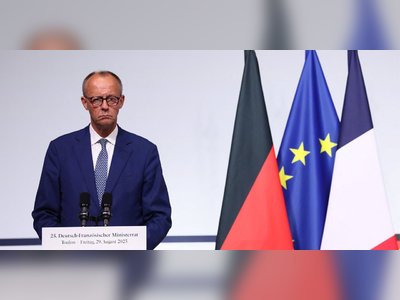
Annalena Baerbock Resigns from Green Party Leadership Role
German Foreign Minister steps down as party whip citing personal reasons amid party challenges and electoral setbacks.
Annalena Baerbock, the German Foreign Minister and a leading figure in the Green Party, has announced her resignation from the position of party whip in the Bundestag.
Baerbock indicated that her decision stems from personal reasons, marking a temporary withdrawal from immediate political duties.
In a correspondence directed to her party colleagues and her local branch in Potsdam, she expressed a need to step away from the limelight and clarified her intention not to pursue leadership within the parliamentary faction at this juncture.
Her leadership has faced significant trials in recent years, characterized by a series of crises that include international conflicts and humanitarian emergencies.
Notably, Baerbock has been active in advocating for enhanced international support for Ukraine amidst the ongoing Russian invasion and has engaged in efforts aimed at securing the release of Israeli hostages taken by Hamas, while also striving to improve humanitarian circumstances in the Gaza Strip.
The comprehensive effectiveness of German foreign policy under Baerbock's stewardship is still under evaluation; however, her tenure has been marred by substantial challenges that have visibly impacted her political capital.
The Green Party is currently reassessing its strategies following a disappointing electoral outcome, securing only 11.6 percent of votes in the recent Bundestag elections.
Baerbock, along with Vice Chancellor Robert Habeck, has played a crucial role in the party’s pivot towards the political center, attempting to attract voters who had previously aligned with the Christian Democratic Union led by Angela Merkel.
This strategy, however, fell short in the latest elections, leading to internal dialogues regarding potential alterations in party policies, especially concerning migration and social matters.
The left faction of the party has been advocating for a more progressive approach to migration, alongside a stronger focus on social policies.
Conversely, centrist members argue that the party's moderate strategies previously facilitated membership growth during Habeck's campaign.
Following the electoral results, Habeck accepted responsibility for the party's performance and indicated a desire to step back from leadership roles.
Initially seen as a strong candidate for the whip position, Baerbock's recent withdrawal from the leadership race has left her political future in a state of uncertainty.
Her departure opens the pathway for the current whip, Katharina Dröge, from the left-wing faction, and co-chair Britta Haßelmann to continue leading the parliamentary group.
Baerbock indicated that her decision stems from personal reasons, marking a temporary withdrawal from immediate political duties.
In a correspondence directed to her party colleagues and her local branch in Potsdam, she expressed a need to step away from the limelight and clarified her intention not to pursue leadership within the parliamentary faction at this juncture.
Her leadership has faced significant trials in recent years, characterized by a series of crises that include international conflicts and humanitarian emergencies.
Notably, Baerbock has been active in advocating for enhanced international support for Ukraine amidst the ongoing Russian invasion and has engaged in efforts aimed at securing the release of Israeli hostages taken by Hamas, while also striving to improve humanitarian circumstances in the Gaza Strip.
The comprehensive effectiveness of German foreign policy under Baerbock's stewardship is still under evaluation; however, her tenure has been marred by substantial challenges that have visibly impacted her political capital.
The Green Party is currently reassessing its strategies following a disappointing electoral outcome, securing only 11.6 percent of votes in the recent Bundestag elections.
Baerbock, along with Vice Chancellor Robert Habeck, has played a crucial role in the party’s pivot towards the political center, attempting to attract voters who had previously aligned with the Christian Democratic Union led by Angela Merkel.
This strategy, however, fell short in the latest elections, leading to internal dialogues regarding potential alterations in party policies, especially concerning migration and social matters.
The left faction of the party has been advocating for a more progressive approach to migration, alongside a stronger focus on social policies.
Conversely, centrist members argue that the party's moderate strategies previously facilitated membership growth during Habeck's campaign.
Following the electoral results, Habeck accepted responsibility for the party's performance and indicated a desire to step back from leadership roles.
Initially seen as a strong candidate for the whip position, Baerbock's recent withdrawal from the leadership race has left her political future in a state of uncertainty.
Her departure opens the pathway for the current whip, Katharina Dröge, from the left-wing faction, and co-chair Britta Haßelmann to continue leading the parliamentary group.
AI Disclaimer: An advanced artificial intelligence (AI) system generated the content of this page on its own. This innovative technology conducts extensive research from a variety of reliable sources, performs rigorous fact-checking and verification, cleans up and balances biased or manipulated content, and presents a minimal factual summary that is just enough yet essential for you to function as an informed and educated citizen. Please keep in mind, however, that this system is an evolving technology, and as a result, the article may contain accidental inaccuracies or errors. We urge you to help us improve our site by reporting any inaccuracies you find using the "Contact Us" link at the bottom of this page. Your helpful feedback helps us improve our system and deliver more precise content. When you find an article of interest here, please look for the full and extensive coverage of this topic in traditional news sources, as they are written by professional journalists that we try to support, not replace. We appreciate your understanding and assistance.











